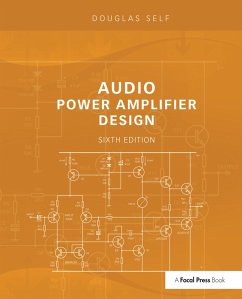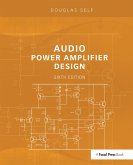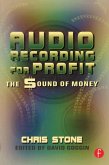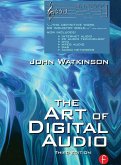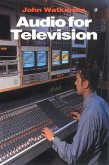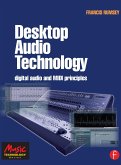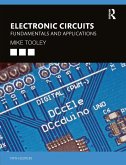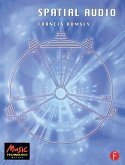Douglas Self
Audio Power Amplifier Design (eBook, PDF)
75,95 €
75,95 €
inkl. MwSt.
Sofort per Download lieferbar

38 °P sammeln
75,95 €
Als Download kaufen

75,95 €
inkl. MwSt.
Sofort per Download lieferbar

38 °P sammeln
Jetzt verschenken
Alle Infos zum eBook verschenken
75,95 €
inkl. MwSt.
Sofort per Download lieferbar
Alle Infos zum eBook verschenken

38 °P sammeln
Douglas Self
Audio Power Amplifier Design (eBook, PDF)
- Format: PDF
- Merkliste
- Auf die Merkliste
- Bewerten Bewerten
- Teilen
- Produkt teilen
- Produkterinnerung
- Produkterinnerung

Bitte loggen Sie sich zunächst in Ihr Kundenkonto ein oder registrieren Sie sich bei
bücher.de, um das eBook-Abo tolino select nutzen zu können.
Hier können Sie sich einloggen
Hier können Sie sich einloggen
Sie sind bereits eingeloggt. Klicken Sie auf 2. tolino select Abo, um fortzufahren.

Bitte loggen Sie sich zunächst in Ihr Kundenkonto ein oder registrieren Sie sich bei bücher.de, um das eBook-Abo tolino select nutzen zu können.
Renowned author Douglas Self covers the major design issues encountered when developing reliable, high-performance audio power amplifiers - making this a must-have book for audio designers and engineers.
- Geräte: PC
- mit Kopierschutz
- eBook Hilfe
- Größe: 15.07MB
Andere Kunden interessierten sich auch für
![Audio Power Amplifier Design (eBook, ePUB) Audio Power Amplifier Design (eBook, ePUB)]() Douglas SelfAudio Power Amplifier Design (eBook, ePUB)75,95 €
Douglas SelfAudio Power Amplifier Design (eBook, ePUB)75,95 €![Audio Recording for Profit (eBook, PDF) Audio Recording for Profit (eBook, PDF)]() Chris StoneAudio Recording for Profit (eBook, PDF)48,95 €
Chris StoneAudio Recording for Profit (eBook, PDF)48,95 €![Art of Digital Audio (eBook, PDF) Art of Digital Audio (eBook, PDF)]() John WatkinsonArt of Digital Audio (eBook, PDF)82,95 €
John WatkinsonArt of Digital Audio (eBook, PDF)82,95 €![Audio for Television (eBook, PDF) Audio for Television (eBook, PDF)]() John WatkinsonAudio for Television (eBook, PDF)33,95 €
John WatkinsonAudio for Television (eBook, PDF)33,95 €![Desktop Audio Technology (eBook, PDF) Desktop Audio Technology (eBook, PDF)]() Francis RumseyDesktop Audio Technology (eBook, PDF)53,95 €
Francis RumseyDesktop Audio Technology (eBook, PDF)53,95 €![Electronic Circuits (eBook, PDF) Electronic Circuits (eBook, PDF)]() Mike TooleyElectronic Circuits (eBook, PDF)43,95 €
Mike TooleyElectronic Circuits (eBook, PDF)43,95 €![Spatial Audio (eBook, PDF) Spatial Audio (eBook, PDF)]() Francis RumseySpatial Audio (eBook, PDF)59,95 €
Francis RumseySpatial Audio (eBook, PDF)59,95 €-
-
-
Renowned author Douglas Self covers the major design issues encountered when developing reliable, high-performance audio power amplifiers - making this a must-have book for audio designers and engineers.
Hinweis: Dieser Artikel kann nur an eine deutsche Lieferadresse ausgeliefert werden.
Dieser Download kann aus rechtlichen Gründen nur mit Rechnungsadresse in A, B, BG, CY, CZ, D, DK, EW, E, FIN, F, GR, HR, H, IRL, I, LT, L, LR, M, NL, PL, P, R, S, SLO, SK ausgeliefert werden.
Hinweis: Dieser Artikel kann nur an eine deutsche Lieferadresse ausgeliefert werden.
Produktdetails
- Produktdetails
- Verlag: Taylor & Francis eBooks
- Seitenzahl: 752
- Erscheinungstermin: 4. Juli 2013
- Englisch
- ISBN-13: 9781136123825
- Artikelnr.: 39190062
- Verlag: Taylor & Francis eBooks
- Seitenzahl: 752
- Erscheinungstermin: 4. Juli 2013
- Englisch
- ISBN-13: 9781136123825
- Artikelnr.: 39190062
- Herstellerkennzeichnung Die Herstellerinformationen sind derzeit nicht verfügbar.
Douglas Wiliams
Chapter 1 Amplifiers and The Audio Signal
Chapter 2 The Basics of Distortion
Chapter 3 Negative Feedback
Chapter 4 Amplifier Architecture, Classes, and Variations
Chapter 5 General Principles and Distortion Mechanisms
Chapter 6 The Input Stage
Chapter 7 The Voltage-Amplifier Stage
Chapter 8 The Push-pull Voltage-Amplifier Stage
Chapter 9 The Output Stage
Chapter 10 Output Stage Distortions
Chapter 11 More Distortion Mechanisms
Chapter 12 Closely Observed Amplifiers: Design Examples
Chapter 13 Compensation and Stability
Chapter 14 Output Networks and Load Effects
Chapter 15 Speed and Slew-rate
Chapter 16 Power Dissipation in Amplifiers
Chapter 17 Class-A Power Amplifiers
Chapter 18 Class XD: Crossover Displacement
Chapter 19 Class-G Power Amplifiers
Chapter 20 Class-D Power Amplifiers
Chapter 21 FET Output Stages
Chapter 22 Thermal Compensation and Thermal Dynamics
Chapter 23 The Design of DC Servos
Chapter 24 Amplifier and Loudspeaker Protection
Chapter 25 Layout, Grounding, and Cooling
Chapter 26 Power Supplies and PSRR
Chapter 27 Power Amplifier Input Systems
Chapter 28 Input Processing and Auxiliary Systems
Chapter 29 Testing and Safety
Chapter 30 A Brief History of Solid-state Power Amplifiers
Chapter 2 The Basics of Distortion
Chapter 3 Negative Feedback
Chapter 4 Amplifier Architecture, Classes, and Variations
Chapter 5 General Principles and Distortion Mechanisms
Chapter 6 The Input Stage
Chapter 7 The Voltage-Amplifier Stage
Chapter 8 The Push-pull Voltage-Amplifier Stage
Chapter 9 The Output Stage
Chapter 10 Output Stage Distortions
Chapter 11 More Distortion Mechanisms
Chapter 12 Closely Observed Amplifiers: Design Examples
Chapter 13 Compensation and Stability
Chapter 14 Output Networks and Load Effects
Chapter 15 Speed and Slew-rate
Chapter 16 Power Dissipation in Amplifiers
Chapter 17 Class-A Power Amplifiers
Chapter 18 Class XD: Crossover Displacement
Chapter 19 Class-G Power Amplifiers
Chapter 20 Class-D Power Amplifiers
Chapter 21 FET Output Stages
Chapter 22 Thermal Compensation and Thermal Dynamics
Chapter 23 The Design of DC Servos
Chapter 24 Amplifier and Loudspeaker Protection
Chapter 25 Layout, Grounding, and Cooling
Chapter 26 Power Supplies and PSRR
Chapter 27 Power Amplifier Input Systems
Chapter 28 Input Processing and Auxiliary Systems
Chapter 29 Testing and Safety
Chapter 30 A Brief History of Solid-state Power Amplifiers
Chapter 1 Amplifiers and The Audio Signal; Chapter 2 The Basics of Distortion; Chapter 3 Negative Feedback; Chapter 4 Amplifier Architecture, Classes, and Variations; Chapter 5 General Principles and Distortion Mechanisms; Chapter 6 The Input Stage; Chapter 7 The Voltage-Amplifier Stage; Chapter 8 The Push-pull Voltage-Amplifier Stage; Chapter 9 The Output Stage; Chapter 10 Output Stage Distortions; Chapter 11 More Distortion Mechanisms; Chapter 12 Closely Observed Amplifiers: Design Examples; Chapter 13 Compensation and Stability; Chapter 14 Output Networks and Load Effects; Chapter 15 Speed and Slew-rate; Chapter 16 Power Dissipation in Amplifiers; Chapter 17 Class-A Power Amplifiers; Chapter 18 Class XD: Crossover Displacement; Chapter 19 Class-G Power Amplifiers; Chapter 20 Class-D Power Amplifiers; Chapter 21 FET Output Stages; Chapter 22 Thermal Compensation and Thermal Dynamics; Chapter 23 The Design of DC Servos; Chapter 24 Amplifier and Loudspeaker Protection; Chapter 25 Layout, Grounding, and Cooling; Chapter 26 Power Supplies and PSRR; Chapter 27 Power Amplifier Input Systems; Chapter 28 Input Processing and Auxiliary Systems; Chapter 29 Testing and Safety; Chapter 30 A Brief History of Solid-state Power Amplifiers;
Chapter 1 Amplifiers and The Audio Signal
Chapter 2 The Basics of Distortion
Chapter 3 Negative Feedback
Chapter 4 Amplifier Architecture, Classes, and Variations
Chapter 5 General Principles and Distortion Mechanisms
Chapter 6 The Input Stage
Chapter 7 The Voltage-Amplifier Stage
Chapter 8 The Push-pull Voltage-Amplifier Stage
Chapter 9 The Output Stage
Chapter 10 Output Stage Distortions
Chapter 11 More Distortion Mechanisms
Chapter 12 Closely Observed Amplifiers: Design Examples
Chapter 13 Compensation and Stability
Chapter 14 Output Networks and Load Effects
Chapter 15 Speed and Slew-rate
Chapter 16 Power Dissipation in Amplifiers
Chapter 17 Class-A Power Amplifiers
Chapter 18 Class XD: Crossover Displacement
Chapter 19 Class-G Power Amplifiers
Chapter 20 Class-D Power Amplifiers
Chapter 21 FET Output Stages
Chapter 22 Thermal Compensation and Thermal Dynamics
Chapter 23 The Design of DC Servos
Chapter 24 Amplifier and Loudspeaker Protection
Chapter 25 Layout, Grounding, and Cooling
Chapter 26 Power Supplies and PSRR
Chapter 27 Power Amplifier Input Systems
Chapter 28 Input Processing and Auxiliary Systems
Chapter 29 Testing and Safety
Chapter 30 A Brief History of Solid-state Power Amplifiers
Chapter 2 The Basics of Distortion
Chapter 3 Negative Feedback
Chapter 4 Amplifier Architecture, Classes, and Variations
Chapter 5 General Principles and Distortion Mechanisms
Chapter 6 The Input Stage
Chapter 7 The Voltage-Amplifier Stage
Chapter 8 The Push-pull Voltage-Amplifier Stage
Chapter 9 The Output Stage
Chapter 10 Output Stage Distortions
Chapter 11 More Distortion Mechanisms
Chapter 12 Closely Observed Amplifiers: Design Examples
Chapter 13 Compensation and Stability
Chapter 14 Output Networks and Load Effects
Chapter 15 Speed and Slew-rate
Chapter 16 Power Dissipation in Amplifiers
Chapter 17 Class-A Power Amplifiers
Chapter 18 Class XD: Crossover Displacement
Chapter 19 Class-G Power Amplifiers
Chapter 20 Class-D Power Amplifiers
Chapter 21 FET Output Stages
Chapter 22 Thermal Compensation and Thermal Dynamics
Chapter 23 The Design of DC Servos
Chapter 24 Amplifier and Loudspeaker Protection
Chapter 25 Layout, Grounding, and Cooling
Chapter 26 Power Supplies and PSRR
Chapter 27 Power Amplifier Input Systems
Chapter 28 Input Processing and Auxiliary Systems
Chapter 29 Testing and Safety
Chapter 30 A Brief History of Solid-state Power Amplifiers
Chapter 1 Amplifiers and The Audio Signal; Chapter 2 The Basics of Distortion; Chapter 3 Negative Feedback; Chapter 4 Amplifier Architecture, Classes, and Variations; Chapter 5 General Principles and Distortion Mechanisms; Chapter 6 The Input Stage; Chapter 7 The Voltage-Amplifier Stage; Chapter 8 The Push-pull Voltage-Amplifier Stage; Chapter 9 The Output Stage; Chapter 10 Output Stage Distortions; Chapter 11 More Distortion Mechanisms; Chapter 12 Closely Observed Amplifiers: Design Examples; Chapter 13 Compensation and Stability; Chapter 14 Output Networks and Load Effects; Chapter 15 Speed and Slew-rate; Chapter 16 Power Dissipation in Amplifiers; Chapter 17 Class-A Power Amplifiers; Chapter 18 Class XD: Crossover Displacement; Chapter 19 Class-G Power Amplifiers; Chapter 20 Class-D Power Amplifiers; Chapter 21 FET Output Stages; Chapter 22 Thermal Compensation and Thermal Dynamics; Chapter 23 The Design of DC Servos; Chapter 24 Amplifier and Loudspeaker Protection; Chapter 25 Layout, Grounding, and Cooling; Chapter 26 Power Supplies and PSRR; Chapter 27 Power Amplifier Input Systems; Chapter 28 Input Processing and Auxiliary Systems; Chapter 29 Testing and Safety; Chapter 30 A Brief History of Solid-state Power Amplifiers;
